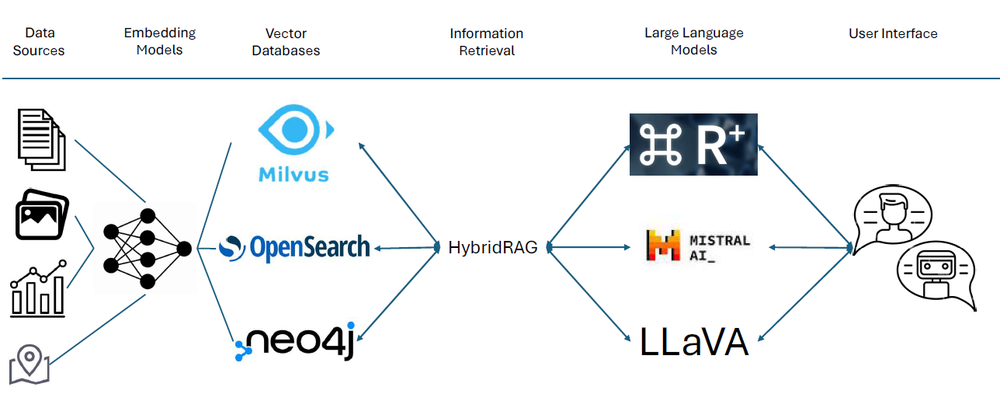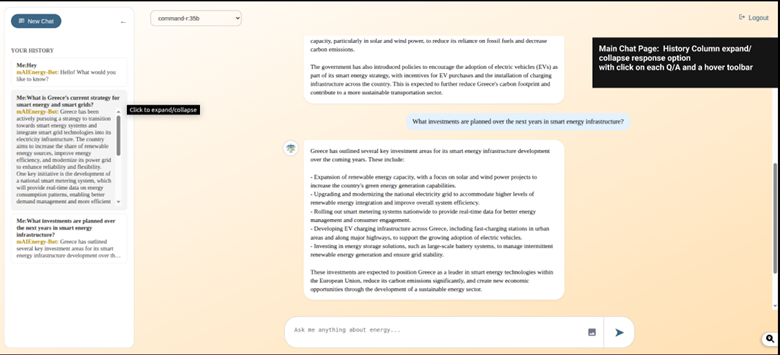mAIEnergy: How Generative AI and EuroHPC Are Powering Energy Literacy for Everyone

Why Now: The Energy Transition is a Data and Experience Problem
Energy organizations face a mix of challenges: fragmented data, fast-changing tariffs and incentives, complex regulations, and customers who want clear and trustworthy answers instantly. The result? Overloaded contact centers, low adoption of efficiency programs, slow citizen engagement in energy transition, and hard-to-navigate subsidy schemes.
Generative AI (GenAI) changes the game when it’s domain-adapted, grounded in verifiable data, and built to scale. That’s exactly what we’re building with mAIEnergy: a GenAI digital assistant that gives citizens accurate, contextual, plain-language guidance, while providing energy stakeholders a modern, scalable channel for engagement and decision support.
The mAIEnergy Project: Goal and Scope
Goal: To build a generative AI assistant that enhances energy literacy and drives action (efficiency, programme participation, LEC engagement). The solution will be delivered initially through B2B partnerships (retailers, aggregators, DSOs, ESCOs, LECs) and later scaled to citizens.
What it does today
- Answers citizen queries on billing, dynamic tariffs, subsidies, renewable energy options, and energy communities.
- Grounds every response in the mAIEnergy knowledge base.
- Leverages a specialised Q&A dataset of ~1M real and synthetic question–answer pairs.
What’s next
Evolve from a “chatbot” to an “action-bot”: recommend actions, trigger workflows (e.g. initiate a subsidy application), and support energy advisors.
How it works
The assistant integrates multiple data types (text, numerical data, geospatial information, and images) through a Retrieval-Augmented Generation (RAG) layer, ensuring that all answers are grounded in trusted sources. Domain-adapted language models — including multimodal models — generate clear, contextual, and reliable responses.

mAIEnergy Architecture
A simple, secure interface
Users can ask a question and receive a clear, concise answer. Built-in history and model controls allow advanced users to compare responses and easily keep track of previous queries.

Training at Scale with EuroHPC
To adapt open LLMs for the energy sector, we fine-tune Mistral-12B, Command-R-35B, and LLaVA-NeXT-72B on the EuroHPC Leonardo Booster, leveraging 50,000 node-hours.
The training was standardised with:
- Frameworks: HuggingFace Transformers, Axolotl (LoRA adapters), and PyTorch Distributed (data and model parallel).
- Engineering for scale: Per-GPU data parallelism on single nodes for Mistral-12B and Command-R-35B; combined model and data parallelism for the multimodal LLaVA-NeXT-72B.
- Reproducibility: SLURM templates, configuration files, environment modules, and caching on HPC scratch to ensure consistent runs.
Deployment and Privacy: On-prem, Governed, Fast
After training, models are deployed on UBITECH’s premises.
- Inference cluster: 2 servers × 3 NVIDIA RTX Ada 6000 each; quantized or raw; >2k tokens/sec sustained
- Access control: secure web app (email verification) and audit trails
How Can Energy Stakeholders Use mAIEnergy Today
- Retailers and ESCOs can use mAIEnergy to clearly explain complex tariffs, simulate bill impacts, and recommend concrete savings actions. By doing so, they not only help customers make informed decisions but also reduce call centre volumes.
- Aggregators can educate and recruit households for demand-response programmes, guiding users step by step through device enrolment and flexibility schemes. This lowers barriers to participation and strengthens engagement.
- Distribution System Operators (DSOs) can provide plain-language communications about outages and maintenance activities. By integrating this with localised information, they can deliver real-time updates to prosumers and local energy communities (LECs), building trust and transparency.
- LECs and energy advisors can enhance member engagement through personalised, localised guides. mAIEnergy also supports onboarding processes and provides governance Q&A, helping communities operate more effectively and inclusively.
Lessons learned with HPC
- One key lesson was “plan twice, run once”—early benchmarking proved invaluable for sharpening both resource sizing and project timelines.
- Standardisation also paid off. By creating reusable training “recipes”, every new experiment became quicker to launch and far more predictable in outcome.
- Finally, company learnt to scale where it matters. Significant performance gains were achieved within nodes, while efficient multi-node scaling required careful engineering and coordination.
Roadmap: From Chatbot to Action-Bot
The next step is to graduate from chatbot to action-bot—models that don’t just explain, but do. The assistant will recommend tailored actions, pre-fill forms, and even trigger workflows such as subsidy applications.
Partners will also scale go-to-market strategy. Phase 1 focuses on B2B partnerships with retailers, aggregators, DSOs, ESCOs, and LECs. Phase 2 will extend the assistant to citizens at scale, enabled through those same partners.
Finally, partners are committed to sharing key artefacts—selected datasets, model checkpoints, and training scripts—to accelerate adoption and innovation among all partners.
About UBITECH - Applied GenAI at Industrial Scale
UBITECH is an innovative software company from Greece which delivers production-grade GenAI systems across multiple sectors:
- Financial services (Viva.com): conversational-first banking with LLM-driven onboarding and advisory services.
- Public sector (mAIgov): Action-Bot workflows that retrieve official documents in real time.
- Tourism (mAiGreece): a multilingual mobile assistant (31 languages) powered by Azure OpenAI and neural search.
- Pharma (VIANEX): a plant operations assistant grounded in SOPs and maintenance manuals.
- Cross-industry (GAIA Glassbox): our co-development platform for transparent, governable, multi-LLM development, enabling assistants across energy, finance, public sector, and more.
For mAIEnergy, company brings together UIBK’s large-scale AI expertise on EuroHPC, FENR’s energy domain knowledge, and UBITECH’s proven track record to deliver secure, industrial-grade AI assistants.
Learn more about this innovation study here.
Author: Costas Mylonas, UBITECH
